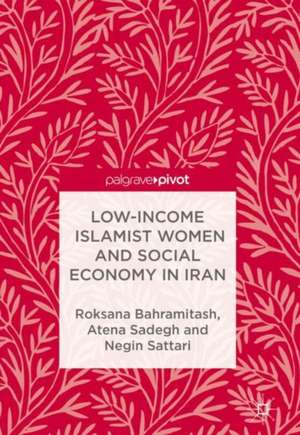Low-Income Islamist Women and Social Economy in Iran
Autor Roksana Bahramitash, Atena Sadegh, Negin Sattarien Limba Engleză Hardback – 31 mar 2018
Preț: 381.21 lei
Nou
Puncte Express: 572
Preț estimativ în valută:
72.94€ • 76.36$ • 60.36£
72.94€ • 76.36$ • 60.36£
Carte tipărită la comandă
Livrare economică 05-19 aprilie
Preluare comenzi: 021 569.72.76
Specificații
ISBN-13: 9781137525383
ISBN-10: 113752538X
Pagini: 88
Ilustrații: V, 76 p.
Dimensiuni: 148 x 210 mm
Greutate: 0.25 kg
Ediția:1st ed. 2018
Editura: Palgrave Macmillan US
Colecția Palgrave Macmillan
Locul publicării:New York, United States
ISBN-10: 113752538X
Pagini: 88
Ilustrații: V, 76 p.
Dimensiuni: 148 x 210 mm
Greutate: 0.25 kg
Ediția:1st ed. 2018
Editura: Palgrave Macmillan US
Colecția Palgrave Macmillan
Locul publicării:New York, United States
Cuprins
1. Introduction.- 2. Social Economy and Women in Iran.- 3. Women’s Role in the Political Economy: An Overview.- 4. Islamist, Islamic and Muslim Women.- 5. Informal Networks of Religious Women and Social Economy.- 6. Conclusion.
Notă biografică
Roksana Bahramitash, PhD, is a McGill sociology graduate currently working as a Montreal-based independent scholar, writer, and consultant. She is the author of several books on gender and political economy, and she has worked as Senior Gender and Employment Advisor for international organizations such as the United Nation Development Office. She has been engaged in field work and consulting research in Iran since 2004.
Atena Sadegh is Consultant for Private Sector Development with Étude Économique Conseil, working on projects around the world on subjects ranging from understanding labour market needs to assessing women's financial capabilities.
Negin Sattari is a PhD candidate at the University of Illinois at Urbana-Champaign, USA, and an instructor in sociology. Her research focuses on women's work and employment.
Textul de pe ultima copertă
This book presents an innovative analysis of the solidarity/social economy among low-income religious women in Iran. For years, the role of low-income women in community care and poverty reduction has been underestimated and under-researched in the broader academic community, due to the “invisible” nature of these informal and predominantly religious networks. As economic hardship in Iran increases, women in the community have mobilized to bring assistance to those struggling to make ends meet. The culmination of years of fieldwork in different parts of the country, this book sheds light on how religious women form the backbone of Iran’s social safety net as the welfare state fails and social protection policies dwindle.
Caracteristici
Contextualizes the role of low-income, religious women in Iran’s solidarity economy Explores the under-researched role of these low-income women in poverty reduction Features original research from Tehran, Isfahan, Shiraz, and Zahedan
